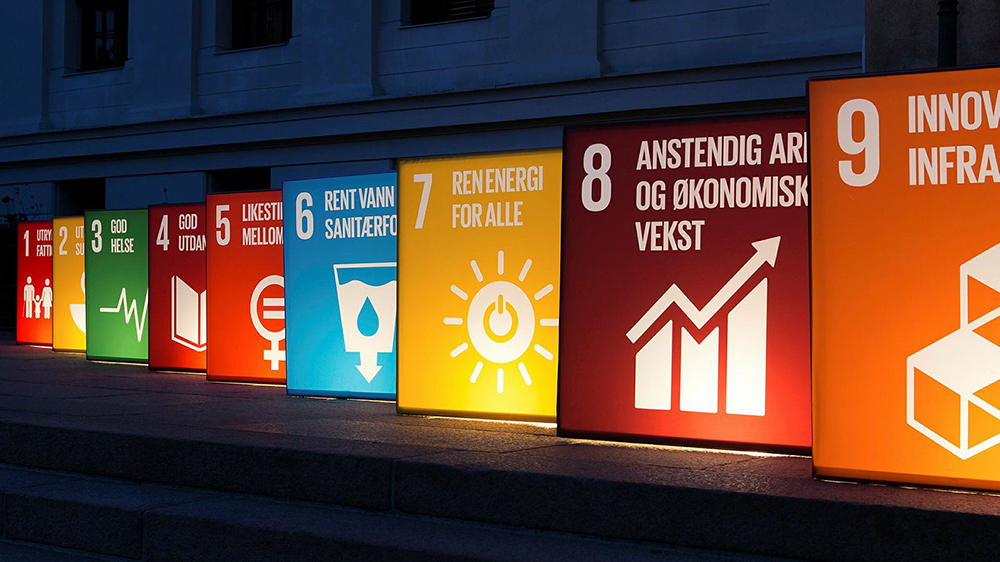Writing in Science Magazine, one of the world's top academic journals, professor Dan Banik and colleagues call for action from policymakers at the SDG Summit in New York this week.

The Sustainable Development Goals (SDGs) on display at the University of Oslo. Foto:Jarli&Jordan/UiO
On 18-19 September, the United Nations will convene a major summit to review the state of the Sustainable Development Goals (SDGs)-the 17 global goals that governments agreed upon in 2015 to guide action towards a prosperous and just future.
With research showing that the SDGs have had little political impact, the UN Summit must pave the way for four major changes in how the SDGs are implemented and governed globally, argues an international group of experts in Science.
The article, based on research led by Utrecht University in the Netherlands, brought together ten experts of sustainability governance, including the University of Oslo's Dan Banik, professor and director of the Oslo SDG Initiative at the Centre for Development and the Environment.

"The politics of sustainable development has not received the attention it deserves. With an increased number of actors involved at various levels of society, the sustainable development narrative has often focused on a win-win narrative while glossing over areas where political agreement is more difficult to reach," says Dan Banik.
Four reforms needed
"Our research has shown that the SDGs lack any sizeable impact on political systems," argues Frank Biermann, professor at Utrecht University and the lead author of this study. He continues, "Now is the moment for change. Governments must urgently launch a process to strengthen the SDG framework through four make-or-break reform measures."
First, the authors call for the SDGs to be strengthened in a way that commits high-income countries to stronger and more concrete action. Wealthier countries have typically focused on those SDGs that they can most easily achieve, and the 2030 Agenda's universal approach may be obscuring unequal global consumption and emissions patterns. Also, with inadequate finance holding back SDG implementation in the Global South, stronger commitments by high-income countries to equitable financing solutions are needed.
Second, the SDGs must be adjusted to new challenges, improved scientific understanding, and past failures in implementation. The goals must become more adaptable to escalating crises of ecological breakdown, global pandemics, and rising inequalities, and the UN should introduce regular review rounds where countries can adjust their ambitions to evolving global circumstances.
Third, the SDGs are not legally binding and are often merely vague commitments. While this approach has helped to bring all governments together under the broad banner of the SDGs, it is no longer enough. Instead, governments must together take steps to turn at least parts of the SDGs into binding international law. The authors highlight the ongoing negotiations for an international treaty to end plastic pollution as an example, which is linked to SDG 12 (Sustainable Production and Consumption).
Fourth, many SDGs are poorly embedded in the structures, policies, practices, and norms of local, national, and international institutions and political systems. Governments need to build stronger institutions, both internationally and at home, to make the SDGs a fundamental part of how they operate and make decisions. To support this, the researchers argue that much stronger global oversight of the SDGs is needed. One option would be the creation of a UN Council on Sustainable Development as a major centre of global sustainability coordination in the UN system.
They also draw on recent research showing the SDGs are making a notable impact through the work of cities, provinces, and parts of civil society, arguing that strengthening these networks can also play a key role in accelerating the SDG agenda.
A global agenda
The UN's 17 Sustainable Development Goals sit at the heart of the UN's global "2030 Agenda for Sustainable Development". One of a string of recent high-profile global megaconferences attempting to mobilize action for a sustainable future, the UN SDG Summit in September 2023 could act as a springboard to achieving the goals by 2030.
"Although the world was off track before the emergence of COVID-19, the pandemic has reversed many development gains. Apart from a few exceptions, governments all over the world have struggled to coordinate policies that promote both environmental and developmental outcomes. As world leaders meet at the United Nations in New York this week, it is time to revisit and further strengthen the ambitious commitments made in 2015 and make the achievement of the SDGs the focus on global development efforts," says Dan Banik.






